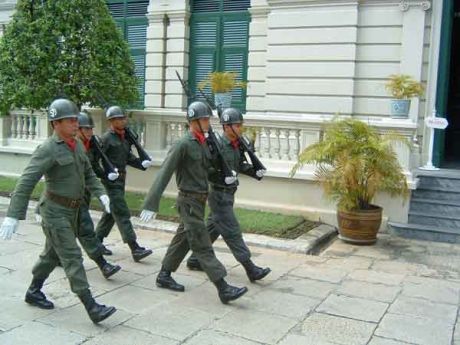Shared
You are here
Demonstrators in Bangkok resist coup by the military in Thailand

May 29, 2014
General Prayuth Chan-ocha officially took power in Thailand on Thursday of last week – and mass protests simultaneously erupted.
They hit many areas of Bangkok but also Chiang Mai and other towns. Crowds defied armed troops, telling them to go home. Middle aged women berated young soldiers.
These protests are spontaneous but it would be a mistake to think that they are “unorganised”. Pro-democracy activists have been creating grassroots networks for years. They include ordinary working class people, although not as organised trade unionists. The more the protests grow, the more those taking part and watching gain confidence. Communication in these networks can be via social media, but word of mouth is also extremely important.
The hope is that this movement will grow and will reach out to the organised working class. But this will take time. It may well be a case of “two steps forward, one step back”. Many arrests have taken place and the military is trying to crush the movement.
The protests shattered a number of myths. Firstly the uprising in Bangkok proves that Red Shirt and pro-democracy ideas are influential there. Commentators previously claimed support for the Red Shirts was concentrated in rural areas.
Warring
General Prayuth claimed he “had no choice” but to stage the coup to stop further conflict between two warring factions. Yet, quite predictably, the military has concentrated on arresting and questioning Red Shirts and other pro-democracy activists. Since the military staged a coup in 2006, it has sided with the anti-democratic conservatives among Thailand’s elites. This reactionary coalition includes the “Democrat” Party and street mobs, top officials and judges, the middle classes, and various conservative academics and NGO leaders.
It takes immense courage to defy a military junta and stand in front of armed soldiers. In 2010 General Prayuth ordered the killing of nearly 90 Red Shirt demonstrators who were demanding democratic elections.
Those who wish to ignore the role of ordinary people claim that the crisis is merely an elite dispute. They say it has been made more urgent by the issue of who will succeed the aged king as head of state. Yet the Red Shirt movement, which grew after the 2006 coup, is the largest social movement in Thai history. And the king has always been weak and cowardly. When staging the present coup, General Prayuth made no pretence at taking orders from the king or securing his approval.
This long-running Thai crisis is really a result of a clash between the conservative patron-client way of conducting politics and a more modern one. Thaksin Shinawatra, a billionaire politician, made serious efforts to modernise Thai society to increase competitiveness after the 1996 Asian economic crisis. His party became hugely popular after introducing the first universal healthcare scheme and job creation programmes in rural areas. Millions of ordinary people have a real stake in protecting democracy. Yet Thaksin and his sister Yingluck don’t want to lead the all-out assault on the old order that is necessary to defend and develop democracy.
This is shared from Socialist Worker (UK)
Section:
Topics:










